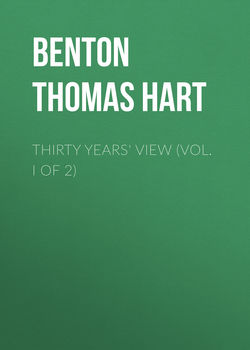Читать книгу Thirty Years' View (Vol. I of 2) - Benton Thomas Hart - Страница 21
CHAPTER XVIII.
DEATH OF JOHN TAYLOR, OF CAROLINE
ОглавлениеFor by that designation was discriminated, in his own State, the eminent republican statesman of Virginia, who was a Senator in Congress in the first term of General Washington's administration, and in the last term of Mr. Monroe – and who, having voluntarily withdrawn himself from that high station during the intermediate thirty years, devoted himself to the noble pursuits of agriculture, literature, the study of political economy, and the service of his State or county when called by his fellow-citizens. Personally I knew him but slightly, our meeting in the Senate being our first acquaintance, and our senatorial association limited to the single session of which he was a member – 1823-24; – at the end of which he died. But all my observation of him, and his whole appearance and deportment, went to confirm the reputation of his individuality of character, and high qualities of the head and the heart. I can hardly figure to myself the ideal of a republican statesman more perfect and complete than he was in reality: – plain and solid, a wise counsellor, a ready and vigorous debater, acute and comprehensive, ripe in all historical and political knowledge, innately republican – modest, courteous, benevolent, hospitable – a skilful, practical farmer, giving his time to his farm and his books, when not called by an emergency to the public service – and returning to his books and his farm when the emergency was over. His whole character was announced in his looks and deportment, and in his uniform (senatorial) dress – the coat, waistcoat, and pantaloons of the same "London brown," and in the cut of a former fashion – beaver hat with ample brim – fine white linen – and a gold-headed cane, carried not for show, but for use and support when walking and bending under the heaviness of years. He seemed to have been cast in the same mould with Mr. Macon, and it was pleasant to see them together, looking like two Grecian sages, and showing that regard for each other which every one felt for them both. He belonged to that constellation of great men which shone so brightly in Virginia in his day, and the light of which was not limited to Virginia, or our America, but spread through the bounds of the civilized world. He was the author of several works, political and agricultural, of which his Arator in one class, and his Construction Construed in another, were the principal – one adorning and exalting the plough with the attributes of science; the other exploring the confines of the federal and the State governments, and presenting a mine of constitutional law very profitably to be examined by the political student who will not be repulsed from a banquet of rich ideas, by the quaint Sir Edward Coke style – (the only point of resemblance between the republican statesman, and the crown officer of Elizabeth and James) – in which it is dressed. Devotion to State rights was the ruling feature of his policy; and to keep both governments, State and federal, within their respective constitutional orbits, was the labor of his political life.
In the years 1798 and '99, Mr. Taylor was a member of the General Assembly of his State, called into service by the circumstances of the times; and was selected on account of the dignity and gravity of his character, his power and readiness in debate, and his signal devotion to the rights of the States, to bring forward those celebrated resolutions which Mr. Jefferson conceived, which his friends sanctioned, which Mr. Madison drew up, and which "John Taylor, of Caroline," presented; – which are a perfect exposition of the principles of our duplicate form of government, and of the limitations upon the power of the federal government; – and which, in their declaration of the unconstitutionality of the alien and sedition laws, and appeal to other States for their co-operation, had nothing in view but to initiate a State movement by two-thirds of the States (the number required by the fifth article of the federal constitution), to amend, or authoritatively expound the constitution; – the idea of forcible resistance to the execution of any act of Congress being expressly disclaimed at the time.
